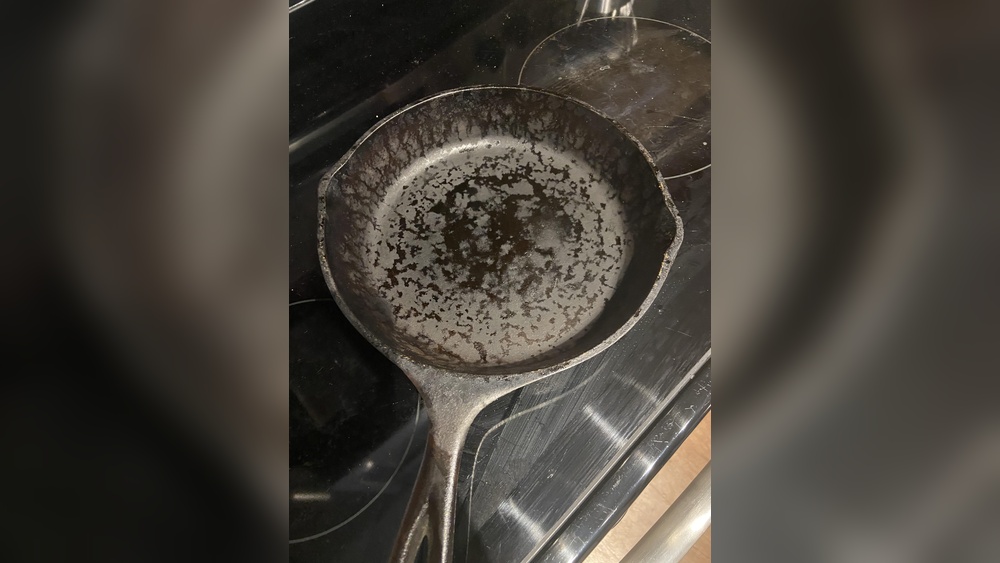If you love cooking with a cast iron skillet, you know how important it is to keep it well-seasoned. But have you ever wondered if avocado oil is a good choice for seasoning your skillet?
You might have heard mixed opinions or felt unsure which oil works best. This article will clear up the confusion and help you decide if avocado oil can give your cast iron that perfect, long-lasting non-stick surface. Keep reading to find out how avocado oil measures up and whether it’s the right fit for your kitchen.

Credit: www.reddit.com
Benefits Of Seasoning Cast Iron
Seasoning a cast iron skillet is key to keeping it in good shape. It builds a protective layer that improves cooking and care. This process is simple but makes a big difference for your skillet’s life and performance.
Using the right oil, like avocado oil, helps create a strong, lasting seasoning. This makes cooking easier and keeps the skillet safe from damage.
Improves Non-stick Surface
Seasoning forms a smooth layer on the skillet’s surface. This layer stops food from sticking. It helps you cook eggs, pancakes, and other foods without trouble. The more you season, the better the non-stick surface gets.
Prevents Rusting
Cast iron can rust if it gets wet. Seasoning adds a protective coat that blocks moisture. This keeps your skillet dry and safe. Regular seasoning means your skillet lasts many years without rust.
Enhances Flavor
Seasoned skillets add a special taste to food. The oil layer creates a subtle, rich flavor. Over time, this flavor improves with use. It makes meals cooked in cast iron more delicious.
Why Choose Avocado Oil
Avocado oil is a popular choice for seasoning cast iron skillets. It offers benefits that help create a strong, lasting coating on the pan. This oil stands out for its heat resistance and health benefits. It also has a mild flavor that does not change the taste of food.
High Smoke Point
Avocado oil has a high smoke point around 520°F (271°C). This means it can handle very hot temperatures without burning. A high smoke point is important for seasoning. It helps form a hard, smooth layer on the skillet’s surface. Other oils with lower smoke points may burn and create sticky spots.
Nutritional Advantages
Avocado oil contains healthy fats like monounsaturated fatty acids. These fats support heart health and reduce inflammation. Using this oil for seasoning adds a small amount of healthy fat to your cookware. It is also free from trans fats and harmful chemicals found in some processed oils.
Neutral Taste
The taste of avocado oil is light and neutral. It does not overpower the natural flavors of food cooked in the skillet. This makes it a good choice for seasoning because it won’t leave a strong smell or taste. Your meals will taste just as they should, without any added oil flavor.
Preparing Your Skillet
Before seasoning a cast iron skillet with avocado oil, preparation is key. A clean and dry pan helps the oil bond well with the surface. This process ensures a smooth, non-stick coating that lasts longer.
Follow simple steps to get your skillet ready. Each step helps protect your pan and improves cooking results.
Cleaning The Pan
Start by removing any rust or old seasoning. Use warm water and a stiff brush. Avoid soap, as it can strip the skillet’s natural oils.
For tough spots, scrub with coarse salt and a little water. Rinse the skillet thoroughly to remove debris. A clean surface allows the oil to absorb evenly.
Drying Thoroughly
Water left on the skillet can cause rust. Dry the pan completely with a clean towel. Then, heat it on the stove or in the oven for a few minutes.
Heating removes any remaining moisture. A dry skillet ensures the avocado oil creates a strong, lasting layer.

Credit: www.reddit.com
Step-by-step Seasoning Process
Seasoning a cast iron skillet with avocado oil is easy and effective. The process strengthens the pan’s surface and stops rust. Follow these simple steps to get the best results and enjoy cooking with your skillet for years.
Applying Avocado Oil
Start with a clean, dry skillet. Pour a small amount of avocado oil onto the pan. Use a paper towel to spread the oil evenly. Cover every part of the skillet, including the sides and handle. Wipe off any extra oil. The layer should be thin, not sticky.
Heating Techniques
Preheat your oven to 450°F (232°C). Place the skillet upside down on the oven rack. Put a baking sheet or foil on the lower rack to catch drips. Heat the skillet for one hour. The high heat helps the oil bond with the iron.
Cooling And Repeating
Turn off the oven and let the skillet cool inside. This can take about two hours. After cooling, check the surface. For a stronger seasoning, repeat the oiling and heating steps two to three times. Each layer builds a better non-stick surface.
Common Mistakes To Avoid
Seasoning a cast iron skillet with avocado oil can improve its performance and lifespan. Avoiding common mistakes helps you get the best results. Small errors can cause uneven seasoning or sticky residue. Knowing what to avoid saves time and effort.
Using Too Much Oil
Applying too much avocado oil creates a sticky, uneven layer. The oil should be thin and even on the skillet surface. Excess oil pools and does not dry well. Use a small amount, then wipe off the extra with a cloth.
Inadequate Heating
Heating the skillet too low stops the oil from bonding properly. The pan must reach a high temperature to cure the oil. Heat the skillet in the oven at 400-450°F for at least an hour. This step forms a strong, smooth coating on the surface.
Skipping Cleaning
Not cleaning the skillet before seasoning ruins the process. Dirt, rust, and old residue block the oil from sticking. Wash the skillet well with warm water and a brush. Dry it completely before applying avocado oil for best results.

Credit: prolinerangehoods.com
Maintaining Your Seasoned Skillet
Maintaining your seasoned cast iron skillet keeps it non-stick and durable. A well-cared skillet lasts for years and improves with use. Regular care helps avoid rust and food sticking. Simple steps make a big difference in your skillet’s performance.
Proper Cleaning Tips
Clean your skillet right after cooking. Use warm water and a soft brush or sponge. Avoid soap to keep the seasoning intact. Never soak the skillet in water. Dry it fully with a towel or by heating on the stove.
Regular Oil Application
Apply a thin layer of avocado oil after each cleaning. Use a paper towel to spread the oil evenly. Heat the skillet on low for a few minutes. This seals the surface and strengthens the seasoning. Repeat often to keep the skillet smooth and shiny.
Storage Recommendations
Store the skillet in a dry place to avoid rust. Keep the lid off or place a paper towel inside. This stops moisture from building up. Avoid stacking heavy items on top to protect the seasoning. Proper storage helps your skillet stay ready for cooking.
Comparing Avocado Oil To Other Oils
Choosing the right oil for seasoning your cast iron skillet affects the pan’s performance. Oils differ in smoke points and drying properties. These factors impact the seasoning quality and durability. Avocado oil is popular, but how does it compare to other oils? Below, we explore flaxseed oil, vegetable oil, and canola oil.
Flaxseed Oil
Flaxseed oil has a very low smoke point. It dries and hardens well, forming a strong seasoning layer. It creates a smooth, non-stick surface after multiple coats. However, flaxseed oil can go rancid quickly. It needs careful storage in a cool, dark place. Many cast iron users trust flaxseed oil for lasting seasoning.
Vegetable Oil
Vegetable oil is easy to find and affordable. It has a moderate smoke point, suitable for seasoning. It forms a decent non-stick layer but may not be as durable. Vegetable oil is less drying than flaxseed oil. It works well for quick seasoning but might require reapplication more often.
Canola Oil
Canola oil has a higher smoke point than vegetable oil. It is light and neutral in flavor. Canola oil creates a smooth seasoning layer with regular use. It is less likely to smell or taste bad. This oil is a solid choice for everyday cast iron care. Many cooks prefer canola oil for its balance of price and performance.
Troubleshooting Seasoning Issues
Seasoning a cast iron skillet with avocado oil can sometimes cause problems. These problems may affect how your skillet cooks and feels. Knowing how to fix these common issues helps keep your skillet in good shape.
Sticky Residue
Sticky residue often forms when too much oil is used. The oil does not fully bake into the skillet. To fix this, wipe the skillet with a paper towel. Then, bake it at a higher temperature for 30 minutes. This will help the oil harden properly.
Uneven Seasoning
Uneven seasoning looks like patches of dull or shiny spots. This happens when oil is not spread evenly. Use a thin, even layer of avocado oil on the skillet. Rotate the skillet during baking to get all sides coated. Repeat the seasoning process if needed.
Rust Spots
Rust spots appear when the skillet is wet or not dried well. Water causes iron to rust quickly. Dry the skillet thoroughly after washing. Heat it on the stove to remove all moisture. Re-season the rusty areas by applying oil and baking.
Frequently Asked Questions
Can Avocado Oil Effectively Season Cast Iron Skillets?
Yes, avocado oil is excellent for seasoning cast iron. Its high smoke point (around 520°F) helps create a durable, non-stick surface. Applying thin layers and heating properly builds a strong seasoning over time.
How Do You Season Cast Iron With Avocado Oil?
Clean the skillet thoroughly, then apply a thin layer of avocado oil. Heat it in the oven at 450-500°F for one hour. Let it cool and repeat for best results. This process forms a protective coating.
Is Avocado Oil Better Than Other Oils For Seasoning?
Avocado oil is preferred due to its high smoke point and neutral flavor. It polymerizes well, creating a strong, long-lasting seasoning layer. Compared to flaxseed or vegetable oils, it’s less likely to smoke excessively during seasoning.
How Often Should You Season Cast Iron With Avocado Oil?
Season your skillet as needed, usually every few months or when food starts sticking. Regular use and proper cleaning help maintain seasoning, reducing the need for frequent re-seasoning.
Conclusion
Avocado oil works well for seasoning a cast iron skillet. It has a high smoke point that helps create a strong, durable coating. This oil also adds a natural, non-sticky surface to your pan. Seasoning with avocado oil keeps your skillet ready for cooking many meals.
Regular care and seasoning extend your skillet’s life. Try it out and enjoy better cooking results. It’s simple, effective, and worth the effort.

